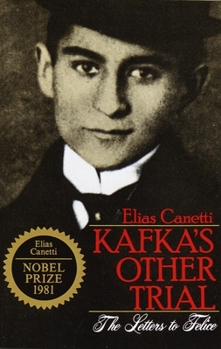Kafka's Other Trial: The Letters to Felice
Select Format
Select Condition 
Book Overview
Felice Bauer was Kafka's first great love and the inspiration for his first great fiction. Six weeks after they met, he wrote "The Judgment" for her in one night of feverish activity. Kafka always inferred to the traumatic, public breaking-off of their engagement as his "tribunal," and indeed he began work on The Trial within a month of that event. Kafka's letters to Felice offer rare insights into the writer's life and art. Elias Canetti's brilliant and sensitive examination of this moving correspondence to shows is the origins of Kafka's voice as a writer and his torment as a man.
Format:Paperback
Language:English
ISBN:0805207058
ISBN13:9780805207057
Release Date:April 1988
Publisher:Penguin Random House LLC (No Starch)
Length:128 Pages
Weight:0.36 lbs.
Dimensions:0.3" x 6.0" x 8.1"
Customer Reviews
2 ratings
The Flaubertain writer for whom nothing is trivial as long as it is right
Published by Thriftbooks.com User , 19 years ago
Elias Canetti fascinated with the genius of Kafka reads one set of the 'letter- diary' literature , that between Kafka and his two - time fiancee Felice Bauer. Canetti sees the letters of Kafka to Bauer as an astounding work of literature, a guidebook to the soul. Kafka met Felice Bauer in August 1913 a day after gathering together the writings of his first published work, "Meditations" . Two days after meeting her he sat down and wrote for nine hours straight , his breakthrough story 'The Judgment' As Cannetti sees it the meeting with Felice Bauer led to one of the most productive literary periods of his life. The three- month idyll ended when the efficient, strong, but not very literary- Bauer showed no enthusiasm for Kafka's first work, and instead praised the works of those whose names we do not know today. This small work traces one chapter in the life of one mankind's greatest literary artists, the one who more than any other made the precise description of his own anxieties and fears an eternal part of the collective human soul portrait. This work is too filled with many insightful passages by Canetti who reads the life of Kafka with sympathy admiration and understanding.
An intriguing aperitif, but not quite the main attraction
Published by Thriftbooks.com User , 25 years ago
Canetti presents a readable overview of Kafka's intense correspondence with Felice Bauer, providing a rough biographical sketch of the author during this turbulent (two abortive engagements to the same woman) yet productive (Metamorphosis, e.g.) time in his life. I don't think Canetti succeeded in proving his notion that Kafka's landmark novel The Trial is a fictionalized representation of his oddly doomed relationship with Felice, but he does point out several interesting parallels which can enhance your enjoyment of Joseph K's misadventures. The real value of Canetti's book is, in my opinion, the fact that it will probably inspire you to read Kafka's own diaries and the actual letters to Felice themselves, and probably with a greater appreciation as well.






